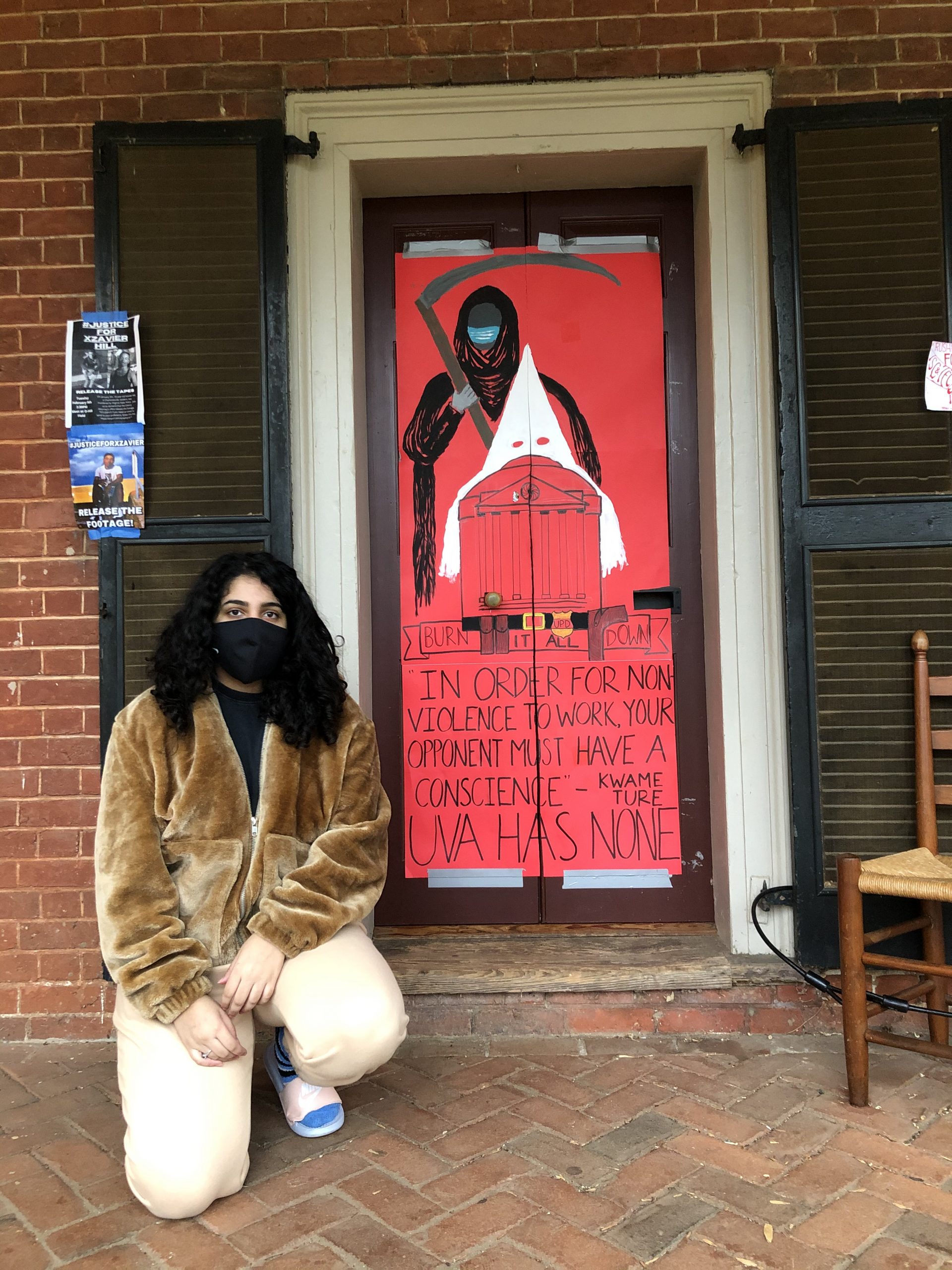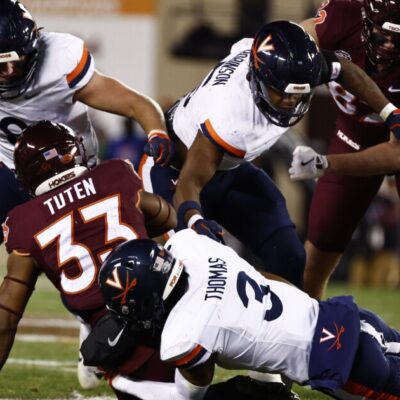UVA’s Lawn is the school’s historic center. Here, prospective students and donors are wowed; here, a select few fourth-years are chosen to live, as a reward for their hard work on behalf of the institution and its associated clubs.
The university would very much like every blade of grass on the Lawn to stay in its place. And so Hira Azher’s signs have cut like a knife.
Last fall, the fourth-year stirred up controversy when she hung a large black sign on her Lawn room door. “Fuck UVA,” read the hand-painted sign. “UVA Operating Costs: KKKops, Genocide, Slavery, Disability, Black and Brown Life.” Other Lawn residents followed her lead and posted similar posters on their doors.
Some alumni and community members urged UVA administration to forcibly take down the signs, claiming they were offensive to Lawn visitors. (Azher says several people harassed her and tried to cut down her poster.) After consulting with its legal team, the university ruled that the signs were protected under the First Amendment and should stay up, though it also changed the policy for Lawn room door signs moving forward. Starting next year, their size will be restricted.
UVA President Jim Ryan penned a letter to the school community entitled “Great and Good, Revisited,” in which he wrote that “personally, I find the signs deeply disappointing,” but that “I believe it is a matter of principle and the obligation, especially of universities, to protect speech even when it is offensive.”
However, when Azher, a Muslim woman of color, put another poster criticizing the university on her door earlier this month, Housing and Residence Life accused her of inciting violence. She was told to take the sign down—or possibly be kicked out of her room.
“I was just really angry and frustrated,” says Azher. “This is so obviously not an incitement of violence.”
The second sign is a bright red poster showing the Rotunda surrounded by flames, its clock replaced with a camera shutter. Below the Rotunda is a camera, belt buckle, University Police Department badge, gun, and a banner stating, “Burn it all down!” A Ku Klux Klan robe, along with the Grim Reaper holding a scythe and wearing a mask, loom behind the building. Underneath the scene is a quote from civil rights activist Kwame Ture: “In order for non-violence to work, your opponent must have a conscience,” followed by Azher’s take: “UVA has none!”
Angered by the murder of Xzavier Hill and other acts of police brutality in the Charlottesville area, as well as the surge in COVID cases following fraternity and sorority rush, Azher put the poster on her door on March 11. Two days later, she says a university dean and a facilities management employee showed up, and told her they had to take down her sign. (Azher opted to take it down herself, so it would not be thrown away.) They also handed her a letter from Housing and Residence Life, claiming the sign “advocates physical violence” and was not protected speech.
“The threatening nature of this Lawn sign is particularly apparent in the face of recent history, including the fear and intimidation brought to the Lawn by torch-bearing rioters on August 11, 2017, the violence that continued the following day, and the January 6, 2021 insurrection at the Capitol that resulted in several deaths,” reads the letter.
“If you post this or a similar sign on your door in the future, you will be subject to further discipline, including potential removal from University housing,” the letter ends.
Azher argues that UVA completely misrepresented the meaning of her poster, which she says criticizes the school’s surveillance of students and the community, history of white supremacy and police violence, and its mishandling of the ongoing coronavirus pandemic. UVA “does not care about the violence it inflicts upon the Charlottesville community and UVA students, especially on the most marginalized of those groups,” Azher says. “The [quote] combined with the ‘Burn it all down’ is a statement that this system entirely needs to be shut down.”
Virginia ACLU Executive Director Claire Guthrie Gastañaga also disagrees with UVA’s rationale for removing Azher’s poster.
In order to be exempted from the First Amendment, “speech must be ‘directed to inciting or producing imminent lawless action and is likely to incite or produce such action,’” says Gastañaga. “[The poster] does not appear to be intended to produce ‘imminent lawless action,’ and neither is a poster with a quotation standing alone likely to ‘produce’ such action.”
A UVA spokesman did not respond to request for comment by press time.
The [Ture quote] combined with the ‘Burn it all down’ is a statement that
this system entirely needs to be shut down
Hira Azher, UVA fourth-year
Second-year Ella Tynch, UVA Young Democratic Socialists of America communications chair, accuses the university of being hypocritical when deciding what is acceptable and unacceptable on the Lawn. There will soon be additional restrictions on Lawn room signs, but “no restrictions on whether or not students can run naked down the Lawn,” Tynch says.
“It’s very clear that these restrictions are in response to a specific leaning [and] political opinion,” says Tynch, referencing last year’s “Fuck UVA” Lawn posters.
This is not the first time this spring that the university has tried to silence Azher’s acts of protest. On February 28, she put a poster on her door that was almost identical to the one HRL forced her to take down this month, but did not picture flames surrounding the Rotunda. The poster was torn down in the middle of the night the same day, she says.
Azher assumed a student had removed the original sign, but when HRL asked her to take down the recreated poster several weeks later, the residence administrators informed her they had removed the first sign, too.
“They had never told me why it was taken down, or that they had taken what was mine and I had worked so hard to create,” claims Azher. “This time maybe because I was closing the shutters at night, they weren’t able to take it down discreetly.”
Though Azher does not believe the university had legal grounds to remove her posters, she stresses that the issue is “so much bigger” than freedom of speech.
“[Freedom of speech] has historically always protected hate speech and white supremacy. It has never helped or protected us when we’re fighting for liberation and revolution,” she says. “It’s the same way those Unite the Right rally ‘protesters’ were protected.”
“What will actually be liberating and will actually help us is by focusing on what the issues are and what the sign is raising,” she adds.
Before graduating, Azher plans to put up one last sign—but will have to make sure it will not cost her her spot on the Lawn.
“Regardless of a little sign or not, I know that this resistance to UVA and these issues that have been brought up by people before me will continue to be brought up after me,” she says.






